No products in the cart.
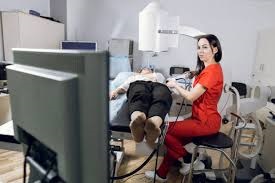
What is Kidney Stone | Nephrolithiasis | Renal Calculi
Definition?
What is Kidney Stone?: To put it simply, kidney stones are insoluble deposits of minerals and salts that crystallize within the kidneys. Kidney stones can have various reasons, including certain foods, obesity, certain medical conditions, and certain supplements and medications.
If you have excessive concentrations of certain minerals in your urine, a solid, pebble-like piece of material called a kidney stone can form in one or both of your kidneys, blocking urine flow and creating inflammatory bowel disease.
If handled by a medical expert, kidney stones rarely permanently damage the kidney otherwise it develops chronic kidney disease.
Moreover disturbs kidney function. Some times too much salt is also responsible for such condition.
A wide variety of waste products can be found in urine. Crystals occur when there is excessive solid matter in the insufficient liquid. Without elimination via urination, the crystals will continue to grow and accumulate in the body and will cause severe pain.
The body’s master chemist, the kidney, usually flushes these substances out through urine. Most people can prevent kidney stones from forming because drinking plenty of fluids flushes them away. Chemicals such as calcium, oxalate, urate, cysteine, xanthine, and phosphate can combine to produce more kidney stones.
Types of Kidney Stones:
· There are for common types of kidney stones:
1. Calcium oxalate
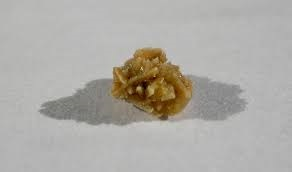
Most kidney stones are composed of calcium oxalate. Stones in the kidney form when there is an imbalance between the number of fluids in the body and the amount of calcium, oxalate, cysteine, or phosphate in the urine.
The vast majority of kidney stones are composed of calcium oxalate named as calcium stones . Stones in the kidney form when there is an imbalance between the number of fluids in the body and the amount of calcium, oxalate, cysteine, or phosphate in the urine.
Kidney stones come in a variety of forms. Your doctor can analyze your stones to determine what kind you have.
2· Uric Acid Stones:
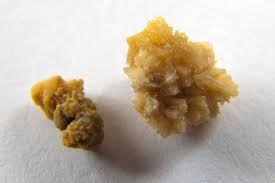
Uric Acid Stones: Kidney forms uric acid stones stones from crystallization of uric acid in the urinary tract. Minerals and salt can crystallize into what is known as a kidney stone. Urinary tract stones, or kidney stones, develop anywhere along the route urine takes out of the body.
Treatment is available for these conditions, which can be painful and result in blood in the urine and uric acid stones form when you intake less water.
These kidney stones can sometimes dissolve on their own. Providers can employ PCNL, sound or shock waves lithotripsy, both noninvasive and minimally invasive, to treat large kidney stone.
3· Struvite Stones:
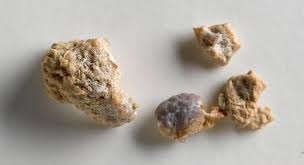
Infections of the urinary tract are the root cause of struvite stones. Magnesium ammonium phosphate (MgNHPO4H2O) stones, often known as “struvite stones,” are a typical form of kidney or urinary tract stones.
Urinary tract infections are a common cause of struvite stones, which is why they are also known as infection stones.
Lack of timely removal of struvite stones can lead to several complications.
Can Urinary Tract Infection leads to struvite stones formation?
Sturdy stones made of magnesium ammonium phosphate (struvite) are linked to urease-producing bacteria found in urinary tract infections (UTIs).
4. Cysteine Stones.
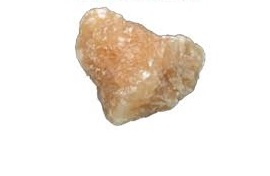
Kidney stones composed of cysteine are known as cysteine stones. The metabolic disorder known as cystinuria frequently produces this molecule. Stopping new cysteine stones from developing is a major focus of treatment. Altering one’s diet and guzzling more H2O are common methods.
Small kidney Stones form in the kidney when a combination of stone forming substances solidifies into a solid. Several different substances in the body such as calcium phosphate can contribute to the formation of these stones. Stones composed of cysteine result from a metabolic disorder known as cystinuria.
Kidney Stone Signs and Symptoms:
Most patients with kidney stones don’t experience any discomfort or sharp pain, until the stone has traveled further up the urinary tract. The ureters are the tubes that connect the kidneys to the bladder.
A kidney stone can cause severe kidney swelling, severe pain and ureter spasms if it goes through the urinary tract and gets caught in the ureter. Some times you can observe blood in your urine. Sometimes it can cause urinary tract infections. This is a list of symptoms that you might experience at that time:
- Lower back and side pain that is both intense and piercing
- Severe Pain that shoots up from the groin and lower abdomen like a dagger
- Pain that comes and goes in waves
- Discomfort or pain while urinating with burning feeling.
- Foul smelling urine
- Reddish color of urine due to presence of blood in your urine flow.
The following are additional symptoms that may be present:
- The color of urine can range from pink to dark brown.
- Cloudy or offensive-smelling urine.
- Alterations in urine habits, such as increased frequency but decreased volume.
- Nausea and vomiting might cause difficulty swallowing and choking.
- An elevated body temperature and chills vomiting urine are classic indicators of an infection.
You may experience shifting or intense discomfort as a stone pass through your urine system.
When is it necessary for a person with renal disease to see a doctor?
An appointment with your doctor should be made if you have any symptoms that cause you concern.
Immediately seek medical attention if any of the following symptoms develop:
- If you’re so uncomfortable, lying down is out of the question.
- There was discomfort and throwing up.
- Irritation, heat, and cold
- An indicator of kidney injury is the presence of blood in the urine.
- A problem with peeing that causes difficulty.
Reasons why you’re more likely to get kidney stones.
There is usually no one reason you would get kidney stones, and multiple variables can raise your risk. Here we list a few of these elements. Among them are:
Lack of Water
It’s important to urinate frequently enough to dilute anything that could harden into stone. Dark urine might be a sign of dehydration or excessive sweating. The ideal hue is light yellow or transparent.
You should urinate roughly 8 cups daily if you have had a stone. Since you lose water through sweat and respiration, try to drink about 10 cups of water per day. Replace your water with a refreshing citrus beverage. Citrate, found in lemonade and orange juice, can prevent such situation.
Diet
Eating habits may significantly impact determining whether or not you develop one of these stones.
When your kidneys produce urine, calcium and oxalate can form the most common sort of kidney stone. Many fruits and vegetables contain the chemical oxalate, generally considered safe in moderate amounts can help in developing kidney stones.
If you’ve ever had a kidney stone, your doctor may recommend avoiding or drastically reducing your intake of foods rich in oxalate. A few illustrations are:
- Spinach
- Rhubarb
- Grits
- Bran flakes
A common myth is that milk consumption leads to the development of kidney stones. That is not the case. Consuming calcium-rich meals (such as milk and cheese) alongside oxalate-containing foods improves the body’s ability to process the latter.
Sodium.
This is primarily obtained from common table salt. Risks of developing various kidney stones are increased. Avoid processed foods like salty snacks, canned goods, and prepackaged meats. It excessiveness can form stones.
Protein from animals.
When urine is overly acidic, it might cause large stones. Chances of developing kidney stones may increase after consuming red meat or shellfish. This can build up in the kidneys, create kidney stones, or accumulate in the joints and induce gout. Even more crucially, the calcium in animal protein increases and the citrate in your urine decreases, promoting stone formation.
Gut problems
Kidney stones are the most common complication when it comes to inflammatory bowel diseases like Crohn’s disease and ulcerative colitis. Diarrhea caused by gastrointestinal issues results in decreased urine output. Intestinal oxalate can be absorbed by the body and end up in the urine.
Obesity
Being overweight almost doubles your risk of developing kidney diseases. That’s the case if your BMI is 30 or higher. At 210 pounds, a person 5 feet 10 inches tall is considered obese.
Surgery for obesity helps patients lose weight and feel better. However, research suggests that those who have the Roux-en-Y gastric bypass, the most popular procedure for surgical weight loss, are at increased risk of developing stones. This threat is exclusive to weight loss procedures that lead to malabsorption and are not present with others.
Additional Health Issues
One or more forms of kidney stones can be triggered by a wide variety of disorders.
Genetic Diseases:
There are diseases with a hereditary component. Kidney cysts are the result of a congenital abnormality called medullary sponge kidney.
Type 2 diabetes:
Diabetic type 2 Increased acidity in the urine has been linked to increased stone formation.
Gout:
Uric acid crystals accumulate in the joints and kidneys due to this illness. Kidney stones can grow to be quite huge and excruciating.
Hyperparathyroidism:
Calcium levels in the body can rise if the parathyroid glands produce an excess of hormones, which increases calcium loss through the kidneys.
Tubular acidosis in the kidneys:
The accumulation of acid in the body causes kidney disease.
Syndrome of excessive fatness:
Clustering of metabolic syndrome traits is associated with increased urine calcium, and oxalate excretion and decreased urinary citrate excretion, all of which contribute to the development and progression of kidney stone disease.
If we want to keep our kidneys healthy and prevent kidney stones formation, what should we do?
1. Some Medications Should Never Be Taken in Excess
Examples of NSAIDs include the pain relievers ibuprofen and naproxen. If taken frequently or in large doses, they can harm your kidneys. Chronic use of proton pump inhibitors (PPIs) for ulcers or GERD has also been linked to an increased risk of kidney damage. Only take these if your doctor prescribes them.
2. Use Antibiotics with Caution
Overuse of antibiotics can harm your kidneys since they target multiple different types of bacteria. Having poorly functioning kidneys makes it more likely, but it can happen to anyone. Penicillin, sulfonamides, and cephalosporin are more likely to lead to side effects than others.
3. Get Off the Herbal Supplements
Manufacturers of dietary supplements are not required to provide evidence of the safety of their goods, and some of them may be harmful to your kidneys. If you already have kidney illness, avoiding those is crucial because they can worsen your health or alter the efficacy of your medications. Consult your medical professional before taking any herbal supplement.
4. Maintain a Balanced Diet
The kidneys filter out everything you consume, including harmful substances like excess sugar, salt, and fat. Bad eating habits have been linked to the development of kidney-harming illnesses such as hypertension, obesity, and diabetes. Vegetables, fruits, and whole grains make up the bulk of a healthy diet, whereas processed foods make up a small percentage.
5. Use Caution With Salt
It’s been found that this mineral has varying effects on its users. It seems to increase protein loss by urination for some people. If you already have kidney problems, this can make your condition worse. High blood pressure is a common cause of kidney disease.
Eating a lot of salt can increase your risk of hypertension and kidney stones, which can be extremely unpleasant and potentially damaging if left untreated.
6. Hydrate Sufficiently
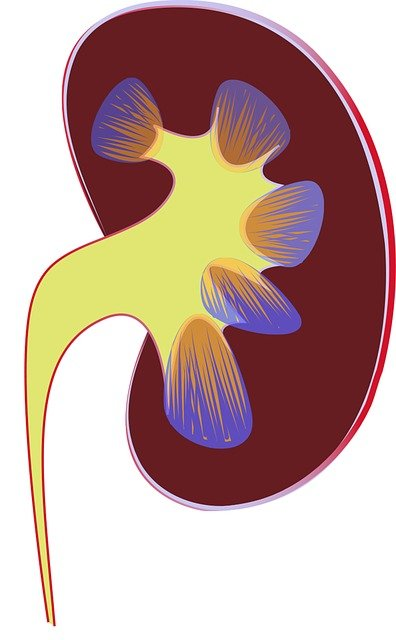
Exactly, Having a full bladder of pee is a sign that your kidneys are functioning properly and that you are getting the nutrients they need. Kidney stones and infections can develop if the microscopic filters inside your kidneys become clogged by a lack of fluids. Additionally lack of fluids cause repeated urinary tract infections.
7. Make exercise a regular part of your routine.
Like a balanced diet, this aids in preventing diseases like diabetes and cardiovascular disease that can eventually harm the kidneys. You can’t just decide to become a gym rat tomorrow and improve your kidney function.
8. Have Frequent Checkups
Recognizing if you have recurrent kidney stones, your risk for renal disease is crucial. Suppose you suffer from cardiovascular disease, high blood pressure, diabetes, or renal failure, your risk increases. Your health care provider may recommend further kidney testing as part of your regular examination if any of these conditions apply to you.
9. Reduce your alcohol intake to safe levels.
A healthy person can probably drink a few without worrying about renal damage. However, heavy drinking (more than four drinks in less than two hours) can result in immediate, severe damage and may cause chronic issues.
10. Care for Medical Issues
Diabetic and hypertensive diseases are the two most frequent kidney problems. Both can be managed with a healthy diet and regular physical activity. A person with diabetes must also monitor their blood sugar levels and take insulin as needed.
11. Maintain a Primary Focus on Raw Materials
12. Eat plenty of fresh foods low in sodium, such as cauliflower, blueberries, seafood, healthy grains, and more.
13. Put your health first by selecting nutritious foods.
Select foods beneficial to your heart and overall health, such as raw or frozen fruits and veggies, whole grains, and low-fat or fat-free dairy. Eat well-balanced meals and limit your intake of added sweets and salt. Maintain a daily salt intake of fewer than 2,300 mg. Try to limit added sugars to less than 10% of your daily caloric intake. Take enough fluids too much.
Determining the Presence of Kidney Stones:
How do doctors determine if a patient has kidney stones?
Medical history, a physical examination, and diagnostic laboratory and imaging procedures all contribute to the diagnosis of kidney stones.
How do medical professionals determine if a patient has kidney stones?
Health professional can diagnose Kidney stones with the help of lab and imaging tests.
Diagnostic testing
Tests of the urine might reveal the presence or absence of the minerals that can cause kidney stones. In addition to imaging techniques, a doctor can diagnose kidney stones by analyzing blood and urine samples.
Urine Tests.
A urologist conducts physical exam of your urine sample to determine your health. You will need to bring a urine sample to be tested at a medical clinic or laboratory. A urinalysis can detect the presence of kidney stone-forming materials and blood in the urine. A urinary tract infection may occur if your urine contains white blood cells and germs.
Blood tests.
Thus, A health care professional may take a blood sample from you and send the sample to a lab to test. The blood test can show if you have high levels of certain minerals in your blood that can lead to kidney stones.
Medical imaging exams
So, Imaging scans help medical practitioners diagnose kidney stones. The tests can also reveal the underlying causes of kidney stones, such as an obstruction in the urinary tract or a congenital abnormality. Perform these imaging exams without putting you to a sleep.
X-ray of the abdominal area.
An abdominal x-ray is a low-dose radiation photograph of the abdominal region that we store on film or computer. A radiologist will examine the results of an abdominal x-ray taken by a hospital or clinic x-ray technician.
Exams with a CT scanner (computed tomography).
Still,CT scans produce images of your urinary tract using a combination of x-rays and computer technology. Medical professionals often utilize CT scans without contrast medium to examine the urinary system, but they may opt to inject you with contrast medium to improve visibility.
Take x-rays while you lie on a table that moves into a tunnel-like apparatus. The size and location of a kidney stone, whether or not it is blocking the urinary tract, and any underlying disorders that may have contributed to the stone’s formation can all be determined via a CT scan.
How to Get Rid and prevent of Kidney Stones:
Then, Most kidney stones are too small enough that can pass through the urinary system and we can treat them at home.
Resolving minor kidney stone issues
Hence, The vast majority of small stones passes naturally through the urinary system. Managing the discomfort requires the use of pain medicines, usually strong ones. If you have a kidney stone, drinking more water can help you pass it.
It’s possible that passing a small kidney stone could be painful, although passing one often takes a day or two and sometimes creates severe pain.
Use non-steroidal anti-inflammatory drugs (NSAIDs) to alleviate discomfort.
If such methods don’t help, your doctor may also suggest the following:
Ensuring that you have plenty of fluids every few hours
Medication that prevents nausea and vomiting
Atypical beta-blockers (medicines to help stones pass)
If you have kidney stones, your doctor may recommend drinking at least 3 liters (5.2 pints) of liquids every day until they pass.
Do kidney stones ever occur in kids?
Obviously, Nephrolithiasis and renal calculi are both names for kidney stones. They manifest most frequently in adults but can also strike toddlers and newborns. High concentrations of some chemicals can build in the kidneys, forming crystals or a stone.
Why can diabetes lead to kidney failure?
Hence, High blood glucose levels, often known as blood sugar, can cause damage to the blood vessels in your kidneys. When blood vessels sustain an injury, their performance declines. High blood pressure, common among people with diabetes, can potentially harm the kidneys.
Amjad Hussain Lashari




292 Comments